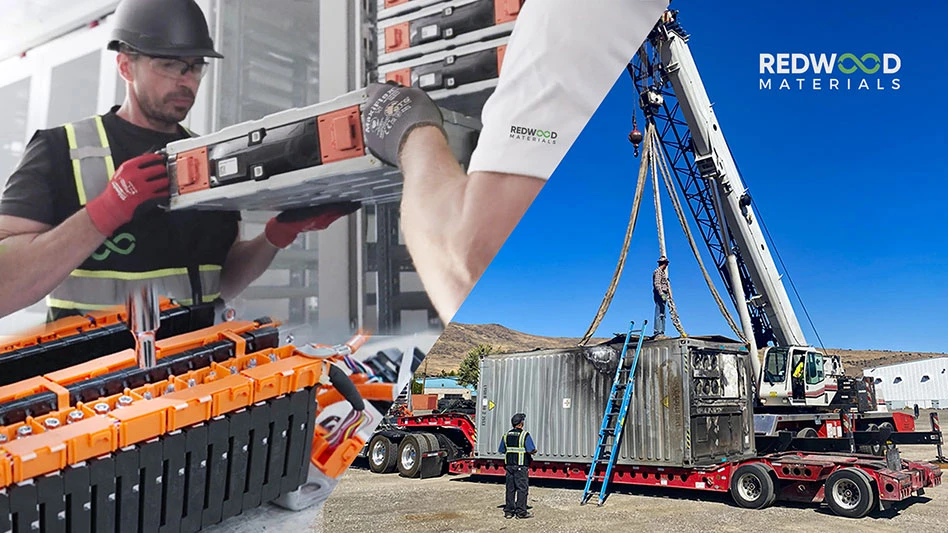
Image courtesy of Redwood Materials
Redwood Materials says it recycles the equivalent of more than 250,000 electric vehicles' worth of batteries, or more than 70 percent of the lithium-ion batteries and production scrap recycled in North America, annually. The Nevada-based company says its extensive experience managing these batteries at end-of-life enables it to safely recover and recycle batteries from various sources, including those involved in roadway incidents and natural disasters.
RELATED: BCMRC24: Innovating to serve
In emergency response situations, Redwood partners with local and national entities to recover lithium-ion batteries. Recently, an crash on I-15, the corridor that connects Las Vegas and Los Angeles, involved an overturned truck carrying a container filled with lithium-ion batteries. The material inside the storage container caught fire, closing the highway for almost two days, according to reports.
Redwood says that even after damage from fires or floods, it can recover 95 percent of the metals contained in the battery on average for reuse in battery production.
Following the I-15 incident, the company worked with Graymar Environmental, with corporate offices in Cherry Hill, New Jersey, which specializes in contaminated material cleanup, to help properly clean up the site. Redwood received the container of batteries (estimated to weigh 70,000 pounds, which the company says is enough to remake about 70 electric vehicles) and recovered and recycled them.
In August 2023, following the devastating Maui wildfires, the company worked with the Environmental Protection Agency (EPA) to collect, transport and manage the damaged lithium batteries from Lahaina, recovering tens of thousands of pounds of batteries ranging from residential stationary storage systems tp golf carts to electric vehicles. These batteries were transported Redwood’s Nevada facility to be recycled, with the recovered nickel, cobalt, copper and lithium returned to the supply chain.
Natural disasters are occurring at unprecedented rates, the company says, as climate change continues to drive the increasing intensity and frequency of storms like Hurricane Milton and Hurricane Helene. As these communities rebuild, Redwood says it anticipates a significant number of damaged EV and energy storage batteries. It offers resources for safely managing and recycling these lithium-ion batteries, supporting sustainable rebuilding efforts while preventing further environmental harm. Redwood says it can assist first responders and ensure that battery management does not add to the challenges of recovering from these storms.
In these situations, Redwood says it deploys specially trained personnel and cutting-edge technology, often exceeding Department of Transportation requirements for packaging and transport to ensure the safest management of materials destined for recycling. By mobilizing quickly and responsibly, Redwood says it can maximize the sustainability of lithium-ion batteries at the end of their life while minimizing the environmental impact from accidents and natural disasters.
Latest from Recycling Today
- BMW Group, Encory launch 'direct recycling’ of batteries
- Loom Carbon, RTI International partner to scale textile recycling technology
- Goodwill Industries of West Michigan, American Glass Mosaics partner to divert glass from landfill
- CARI forms federal advocacy partnership
- Monthly packaging papers shipments down in November
- STEEL Act aims to enhance trade enforcement to prevent dumping of steel in the US
- San Francisco schools introduce compostable lunch trays
- Aduro graduates from Shell GameChanger program





